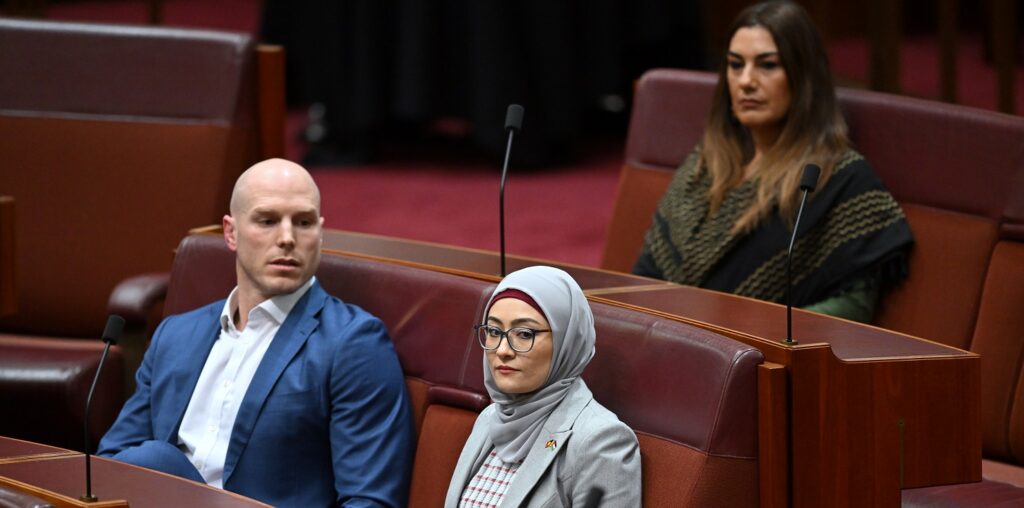Labor’s path to passing its misinformation bill is narrowing, with several key crossbench senators going on the record in the past 24 hours to oppose the legislation.
ACT Senator David Pocock and Tammy Tyrrell of Tasmania, both independents, have stated they’ll vote no.
“I’ve listened to the experts and people in the ACT and I’ll be opposing the Combatting Misinformation and Disinformation Bill, unless major changes are made to the legislation,” Pocock said in a video posted to Facebook overnight.
Pocock said he was hesitant to support a bill that would risk curtailing “freedom of speech and the freedom to protest”, because “in Australia we don’t have an overarching human rights act that entrenches these rights”.
Tyrrell, in her statement, said “putting the responsibility onto social media companies to decide what is or isn’t misinformation in Australia is a slippery slope”.
“It’s important to me that people feel free to express different ideas and opinions without fear of being shut down. Having conversations that challenge our views is how we grow as a community,” she added.
Crikey understands several other crossbench senators are also leaning towards voting no.
Tasmanian Senator Jacqui Lambie told The Sydney Morning Herald at the weekend the government was “rushing” the bill.
“There are lots of problems with this bill,” she was quoted as saying.
Ex-Coalition turned independent Senator for Queensland Gerard Rennick also indicated he was opposed to the bill.
Because the Coalition has said it will oppose the bill, the government will need both the support of the Greens and several extra yes votes from the crossbench. The Greens have said they will await the outcome of an inquiry into the bill before deciding their stance.
Communications Minister Michelle Rowland has said mis- and disinformation “harms democracies [and] economies”.
“Doing nothing is not an option,” she told reporters last month.
Ex-Labor gone independent WA Senator Fatima Payman also appeared sceptical towards the legislation. Her chief of staff Glenn Druery told Crikey the government’s chances of passing it were “not looking good”.
“As the bill stands, the government is scrambling to get the numbers they need. And as we sit here on Wednesday morning at 10 o’clock, I think the government is in trouble. However, the Labor Party has been known to pull rabbits out of their hats in the past, and if they’re clever they might be able to do it again,” he said.
Crikey understands Greens-turned-independent Senator from Victoria Lidia Thorpe was still making up her mind about the bill, which she views as having both some merits and some issues that need addressing.
The inquiry into the bill held its final hearing on Monday, and is due to report by November 25. The issue of requiring social media platforms to crack down on “misinformation” and “disinformation” has become a lighting rod for the right wing, including activists associated with the George Christensen-linked outfit CitizenGO.
Brian Marlow, an activist known for his pro-vaping campaigning who is associated with the Australian Taxpayers’ Alliance, was one of the people who gave evidence to the inquiry on its final day, arguing the bill would be “dead in the water” even if it passed because it might attract opposition from the incoming US president Donald Trump.
“The outcome of what President-elect Trump has said effectively makes this bill null and void and dead in the water,” he told the hearing.
Marlow, who fronted the hearing as a representative for CitizenGO, told Crikey Christensen, the ex-Queensland senator, had been engaged in opposing the bill.
“The first thing we decided to do together was to get stuck into this misinformation bill,” Marlow said. “My view is that the bill needs to be withdrawn. To quote Tony Abbott, the bill needs to be dead, buried, and cremated. It needs to be killed. A lot of people in Australia feel it’s a direct attack on people’s ability to speak freely online.”

